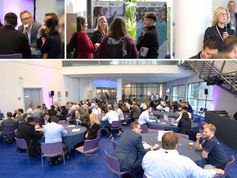Innovating for the future: Lego's skills strategy
In an era where industrial companies face the daunting challenge of transitioning to net zero emissions, the recent collaboration between Lego and Climeworks underscores the critical role of innovative solutions and strategic skills development. As senior executives and decision-makers in the industrial sector grapple with the complexities of achieving net zero, this partnership serves as a compelling case study of commitment and innovation in the face of environmental challenges.
A strategic commitment to carbon removal
Lego's US$2.4m investment in Climeworks' carbon removal services marks a significant step towards its ambitious goal of net zero emissions.
This move not only demonstrates Lego's dedication to environmental stewardship but also highlights the importance of investing in cutting-edge technologies to mitigate climate impact.

Annette Stube, Chief Sustainability Officer at LEGO Group
“We were the first large toy company to announce a science-based emissions reduction target in 2020 and we want to continue to lead the way in finding innovative solutions for the challenges we face,” shares Annette Stube, Chief Sustainability Officer at LEGO Group.
“This is why we are working with innovators like Climeworks – their technology, as part of a varied programme of initiatives, can help us and society as a whole realise the net-zero future that is needed to protect our planet for generations to come”.
Alongside removal of carbon dioxide, Lego is working to reduce emissions from its factories, offices, stores and supply chain, in line with its SBTi approved 37% reduction in emissions across Scope 1, 2 and 3 by 2032 in comparison to 2019.
Climeworks, known for its direct air capture and storage (DAC+S) technology, represents the innovative edge required to drive systemic change in carbon management.
Skills and innovation
The collaboration between Lego and Climeworks emphasizes the necessity of harnessing specific skills and innovative thinking within the industrial sector.
The development and implementation of DAC+S technology, a pioneering approach to carbon removal, necessitate a workforce skilled in engineering, environmental science, and sustainable business practices.
For industrial companies venturing into net zero strategies, investing in such specialized skills is paramount to turning ambitious environmental goals into reality.
Driving systemic change through partnership
Lego's partnership with Climeworks is a testament to the power of collaboration in achieving systemic change.
By aligning with partners that possess complementary expertise and innovative technologies, companies can significantly amplify their impact on sustainability goals.
This approach not only accelerates progress towards net zero but also fosters a culture of continuous learning and adaptation within the workforce.
A call to action for industrial leaders
The Lego-Climeworks partnership serves as a clarion call to industrial leaders about the necessity of embracing innovative solutions and investing in the skills needed to navigate the net zero transition.
As the Intergovernmental Panel on Climate Change (IPCC) endorses carbon dioxide removal as essential for achieving net negative emissions, it is clear that a multifaceted strategy encompassing technology, skills development, and collaboration is crucial.
The strategic collaboration between Lego and Climeworks highlights the integral role of skills and innovation in the industrial sector's race towards net zero. It exemplifies how investing in advanced technologies and fostering a skilled workforce can significantly contribute to environmental sustainability goals.
For senior executives and decision makers, this partnership offers valuable insights into the strategic investments and collaborations necessary to lead their companies towards a sustainable future. In doing so, it reinforces the idea that achieving net zero is not just an environmental imperative but a strategic business opportunity that demands skilled leadership and innovative partnerships.






Comments